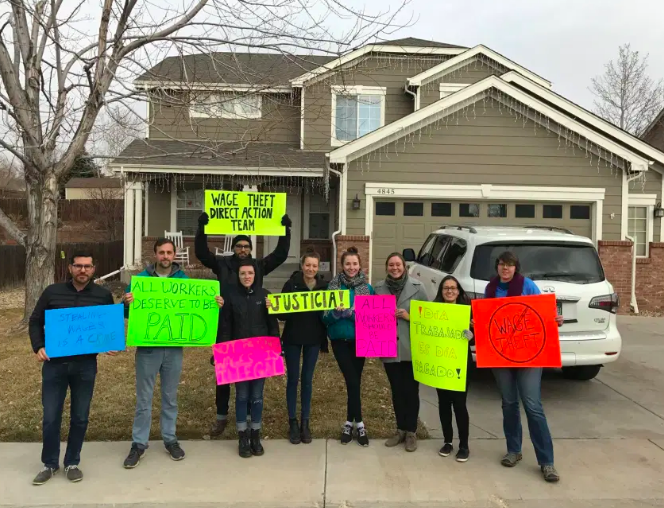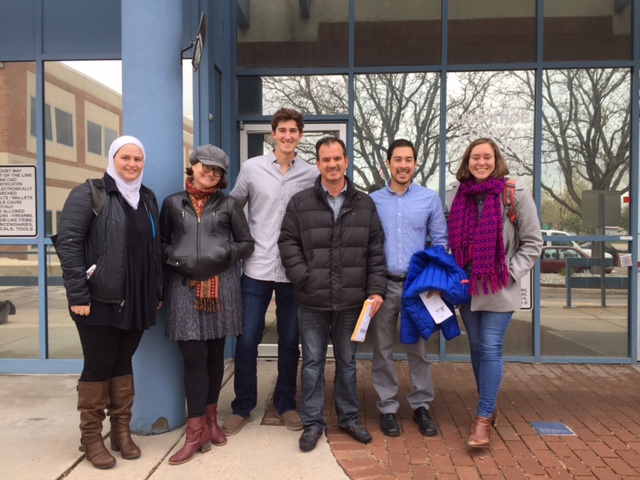Article begins
The theft of immigrant workers’ wages is a growing problem in the United States.
In March 2018, University of Denver law student Katie Brown won $15,000 in County Court for four immigrant workers who had not been paid by their employer. Wage theft—the denial of legally owed wages and benefits—impacts many workers as traditional employment arrangements unravel in advanced economies, but nationwide, foreign-born Latinos suffer disproportionately. Fear of immigration consequences, discrimination, and the deregulation of industries in which foreign-born Latinos concentrate, make them vulnerable to wage theft and hesitant to pursue unpaid wages.
Wage theft violations are rarely accidental, but become a patterned strategy of conducting business and cutting costs.
In conjunction with students, the DU Just Wages team interviewed 170 day laborers and surveyed 411 across five hiring sites in the Denver metropolitan area. The team also interviewed about fifty policy-makers, non-profit staff, employers, and attorneys to understand the wider context of wage theft during Denver’s post-recession construction boom. In the past few years, Colorado has joined other progressive states and localities by passing higher minimum wage laws and more robust wage enforcement laws. In 2019, Colorado also passed legislation to clarify and limit cooperation with Immigration and Customs Enforcement and cities like Denver and Boulder have instituted enhanced protections for immigrants. Yet labor organizing in the state is weak and the state has been quintessentially “purple” on immigration issues. It was among the first states to pass a “Show Me Your Papers” law in 2006, but was also at the forefront of repealing such laws and opening the path for driver’s licenses and in-state tuition for undocumented residents in 2013. In recent years, the Denver metropolitan area has been characterized by a population and construction boom with an accompanying housing shortage. Construction has been vital to the Denver metropolitan area’s post-recession recovery. Yet, it is the sector that accounts for the largest share of wage payment violations in the state.

Image description: A group of students, workers, and community advocates stand in front of an olive colored house. They hold posterboard signs in protest of unfair wages to laborers.
Caption: DAT protest outside an offending employer’s home. A group of students, workers, and community advocates protest unfair wages to laborers. DU Just Wages with contributions by Samantha McGinnis, Amy Czulada, Yessenia Prodero, David Feuerbach, Diego Bleifuss-Prados, and Chris Wheeler
Wage theft violations are rarely accidental, but become a patterned strategy of conducting business and cutting costs. The most common violations experienced by day laborers are underpayment for work completed, misclassification as independent contractors, and outright non-payment. Frequent employer strategies to commit wage theft include:
- paying wages with checks that bounce;
- telling workers they will be paid at the end of the week and then disappearing;
- claiming they will pay later, soon, or on the next project (employers may claim they were not paid by higher level contractors);
- pretending to have never hired the worker; and
- arguing that the quality of work was poor.
Workers at street corner hiring sites mitigate wage theft by insisting on getting paid in cash every day, working for known employers, collecting employer contact information, and demanding a wage floor. They warn other workers when offending employers drive by, “Don’t go, that one doesn’t pay.” Yet, desperation for work, competition, and a lack of options often leads workers to not heed their own advice. One worked worried, for example, that if he asked too many questions, that the employer would simply choose to hire another worker.
The DU Just Wages Project is contributing to efforts to boost proactive enforcement so less burden falls on workers.
According to a survey my team conducted of 411 day laborers between October 2016 and August 2017, 62 percent of day laborers had experienced wage theft, but fewer than 40 percent asked for help. Few saw any money. The team assisted with worker outreach in conjunction with a worker center. However, outreach alone is insufficient when the labor bureaucracy is not designed to serve low-wage immigrant workers. As one day laborer related, “We already know our rights, but I still don’t have my money.”
The team also conducted activist ethnographic research with a volunteer group called the Direct Action Team, or the DAT. Despite the compounding structural barriers that render low-wage immigrant workers vulnerable to wage theft, the DAT highlights how workers, advocates, and attorneys can exert agency amid constraints. The DAT helps workers recover wages through employer negotiations, delegations, protests, and court assistance. In the past two years, the DAT recovered over $20,000 for workers through direct action tactics. But of the nearly 30 small claims court cases they won in the same period, they could only collect money on one. Chasing employers down through the collections process is a labyrinth, leading workers and volunteers on a wild goose chase to locate and serve the employer with additional court filings and fees. Accompanying workers as advocates through wage negotiations helped reveal the systemic exclusions embedded in the legal system even when workers had access, as well as the ways in which research can directly inform activism.

Image description: Six people stand in front of a building with full-length reflective windows, smiling at the camera.
Caption: Students and DAT members accompanying a worker who won a wage theft case in small claims court. DU Just Wages with contributions by Samantha McGinnis, Amy Czulada, Yessenia Prodero, David Feuerbach, Diego Bleifuss-Prados, and Chris Wheeler.
The case Katie won originated at one of the day labor hiring site where my students were alternating survey days with labor rights outreach in conjunction with Denver’s worker center, El Centro Humanitario. The students referred the workers to Towards Justice, a legal services organization that provides free intakes for wage theft cases. Since the case was too small for an attorney, they referred it to the DAT because the workers remained motivated. The team negotiated with the employer, including repeat visits to his home, to no avail. The DAT then passed the case to Katie with the Sturm Civil Litigation Clinic at the University of Denver, which has represented some of the DAT’s cases. This exemplified collaborative impact across legal assistance, research, and advocacy. But it also showed the shortcomings of the legal system to work on behalf of low-wage immigrant workers. The workers still have not been able to collect their money.
The DU Just Wages Project is contributing to efforts to boost proactive enforcement so less burden falls on workers. It helped inform a recent revision to Colorado’s felony theft statute and the Colorado Department of Labor’s rule-making. But solutions need to go beyond policy tweaks. They also require shifting consciousness around the nature of work and discrimination against Latino immigrant workers so that wage theft is not, as one advocate called it, “the new normal.”
Rebecca Galemba is an assistant professor of International Development at the Josef Korbel School of International Studies at the University of Denver. She is the author of Contraband Corridor: Making a Living at the Mexico-Guatemala Border (2017). She is also the co-director of the Korbel Latin America Center and supervisor of the University of Denver Immigrant and Refugee Rights Colectivo that promotes university and community collaborations through research, service, and advocacy on issues related to immigrants and refugees.
Walter E. Little ([email protected]) is contributing editor for the Society for Economic Anthropology’s section news column.
Cite as: Galemba, Rebecca. 2020. “Anthropology of Wage Theft in Colorado.” Anthropology News website, May 22, 2020. DOI: 10.1111/AN.1407

